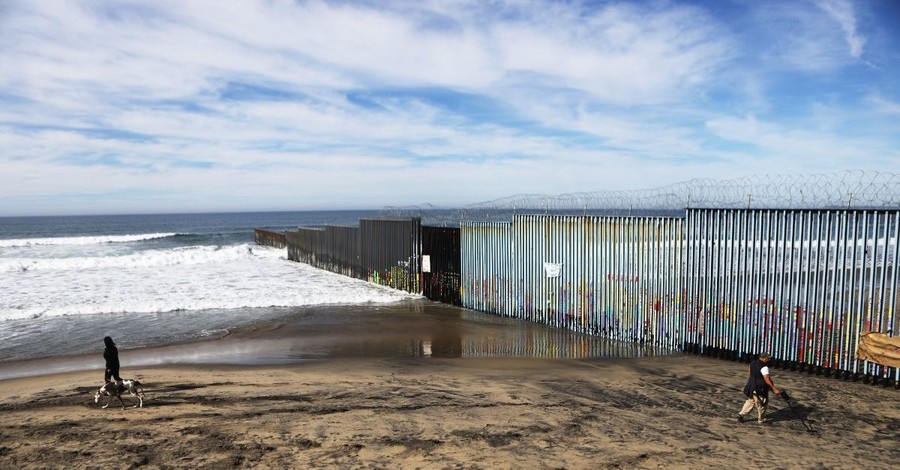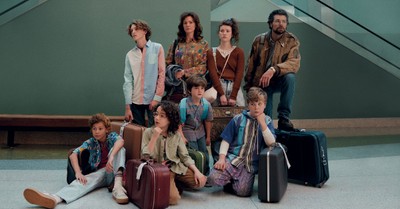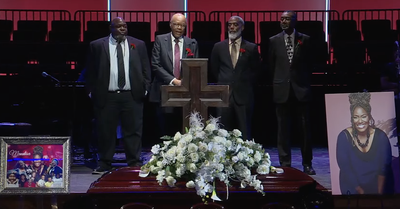
Why has the issue of illegal immigration dominated the conversation in our nation over the years? I believe there are, at least, three reasons the border issue is at the forefront of politics:
- It's a legitimate crisis.
- Some want open borders to add voters to their party.
- It’s hard to balance justice and compassion.
The main question for me was: How does our government address a legitimate issue, show compassion, and administer justice while guarding the American public. So, to find the answers, I recently had the privilege of touring our Mexican border with other California pastors, including Jack Hibbs and Tony Perkins.
What I found was both remarkable and disheartening. Remarkable in that I was able to see firsthand the care and compassion demonstrated by our Border Patrol and Customs officers—the task is enormous. And disheartening because these truths are not being adequately told to the American people and, instead, are being twisted for political gain. If we don't control the true narrative, a false narrative will be controlled by others. This is why I spend a great deal of time writing articles. (More can be found on my website.)
Here are five things that really caught my attention based on my day at the busiest border crossing in America and the fifth-largest in the world—San Ysidro:
1. The media is clearly twisting the facts.
Remember the large caravan that tried to come into America? The border facility that I visited is not set up to receive 7,500 people at once. Some of the negative captions you saw of people sitting under bridges were actually to provide shade while Customs assessed the situation. And the “kids in cages” photo was actually taken in 2014. I hope you caught that — 2014 — before our current president was in office.
One of the biggest shocks came when I was able to talk to the officer who had firsthand knowledge of the woman who was supposedly told to drink from the toilet. The officer on the scene actually said the opposite: “We don’t want them drinking out of toilets.” I’m very disappointed in the lawmakers who twisted this. The standard of living that Customs provides is noteworthy. Immigrants receive four meals a day, and kids are never left alone. Doctors who can provide medication are also on staff. Special meals are even served to people who have dietary restrictions. Granted, there are some disheartening conditions that I wish I had answers for, as in the case of the Matamoros refugee camp on the Texas-Mexico border. But the big lesson for me was that we must acquire our information from reputable sources.
2. Building a wall is not mean-spirited.
I’ve never heard a good argument as to why there shouldn’t be a wall marking boundaries and securing them. Most of us go home to secure borders every night. We lock our doors, shut our gates, and build walls along our property lines. Is that mean-spirited? Of course not. Even hospitals, courthouses, and countless other locations have borders consisting of boundaries, perimeters, and dividing lines. (Wayne Grudem wrote an exceptional article about what the Bible says about border walls.)
Be clear on this point: The push toward open borders is more about votes than about truly helping people. We need not look any further than Venezuela to see the destruction of open borders; it was the final nail in the coffin. When you combine socialism (something all Democratic presidential hopefuls openly support) with open borders like Venezuela, it’s not sustainable. Venezuela was thriving just a little over 20 years ago. Now it finds itself crumbling from within and dealing with deplorable conditions, largely because of open borders with Colombia. They did not steward their sovereignty correctly. We cannot make the same mistake.
As I’ve said before, open borders would be like me telling my kids to leave their windows open in case a stranger needs a warm night’s sleep. That would be severe parental neglect because many harmful things could also enter through those open windows. Open borders would parallel that type of irresponsibility. Our financial system cannot support people flooding in who need assistance. Word of that would spread quickly and we’d soon have 250,000 on our border at one time wanting access. How is that using wisdom? There is a better way, but we must seek God for wisdom.
3. Parents are not being separated from their children as portrayed.
Customs and Border Patrol do everything they can to keep families together. Many of these officers have kids of their own; they feel the pain. When detained, families are not separated. They are treated with dignity and respect. Sadly, kids are often smuggled in with families that they don’t even know. When caught, Customs tries to provide the best environment for the child while sorting out the details.
If a parent is charged with what is referred to as criminal law, then the child is placed with the proper authorities if a close family member cannot be located—not unlike a person being arrested in America for a DUI with a child in the car. If the police officer cannot get a hold of the driver’s family, the child will be placed elsewhere, while the driver is arrested for child endangerment. Border officials spend an enormous amount of time trying to find placement with family members when displacement does happen. In hard conditions, such as in Matamoros, the risk of kids being taken by traffickers is high. But Customs and Border Patrol are not the problems; they, along with the administration, are working toward a solution. As Tony Perkins recently commented, “I have appealed to the president to ensure the U.S. provides the opportunity for those legitimately seeking asylum because of persecution can still find refuge in our country. That said, asylum should not be used as a loophole to come into the country and remain illegally."
Most in the media highlight the bad and avoid the good depending on who is in office. The Washington Examiner recently reported that more than 375,000 immigrants (detained as family units) were released in America in 2019. US Immigration and Customs Enforcement (ICE) helped to release many of these individuals. Why don’t we hear more about the positives?
4. We need to stop the blame game because no one agency owns the entire immigration process.
Different agencies, from Border Patrol to Customs, all have different functions. Border Patrol focuses on preventing people from coming in illegally, whereas Customs deals with people coming in legally (for the most part) at the Port of Entry. Border agencies are not there to turn everyone away like guards at the border of North Korea; they try to care for the needs of the immigrants and point them in the right direction, while simultaneously, fighting crime. I was able to view the bullet holes in the main control tower from someone opening fire some time ago with an automatic weapon. It’s a hard job, and the officers we met were dedicated people. As one person told me, “Agents and Officers see people across every demographic, from people on the vacation of their lives, to people fleeing violence and persecution and running for their lives, every day, 24 hours a day, seven days a week.” In all cases they want everyone to come to the legal Port of Entry–that is the safest way.
No doubt, terrible things happen at the border, but we can't throw the baby out with the bathwater. There are bad politicians, bad policemen, and bad pastors, yet we don’t demand to shut down the government, disband the police force, or close down all churches.
5. The task is monumental; there are no quick fixes.
The compassion of Customs and Border Patrol agents was very evident—they feel for those trying to cross the border, but they have also vowed to protect US citizens. Can you imagine watching for illegal drugs such as fentanyl, heroin, and crystal meth, while at the same time, discerning between what child is being sex trafficked and what family truly needs help? And I thought pastoring was hard. Add to this the thousands of arrest warrants served on an annual basis and the plethora of people speaking different languages crossing the border, and you soon see why this is a major challenge. It's an unbelievable task, and they need our prayers and support rather than our constant criticism.
Click here to read the remainder of this column. The last half may surprise you.
Photo courtesy: ©Getty Images/Mario Tama/Staff
The views expressed in this commentary do not necessarily reflect those of CrosswalkHeadlines.
Shane Idleman is the founder and lead pastor of Westside Christian Fellowship in Southern California and the WCF Radio Network. More can be found at ShaneIdleman.com. Free downloads of his eBooks can be found at www.WCFAV.org. Visit him on Facebook and Twitter. Subscribe to his new podcast, Idleman Unplugged. You can also follow Pastor Shane on the free speech platform Parler.










